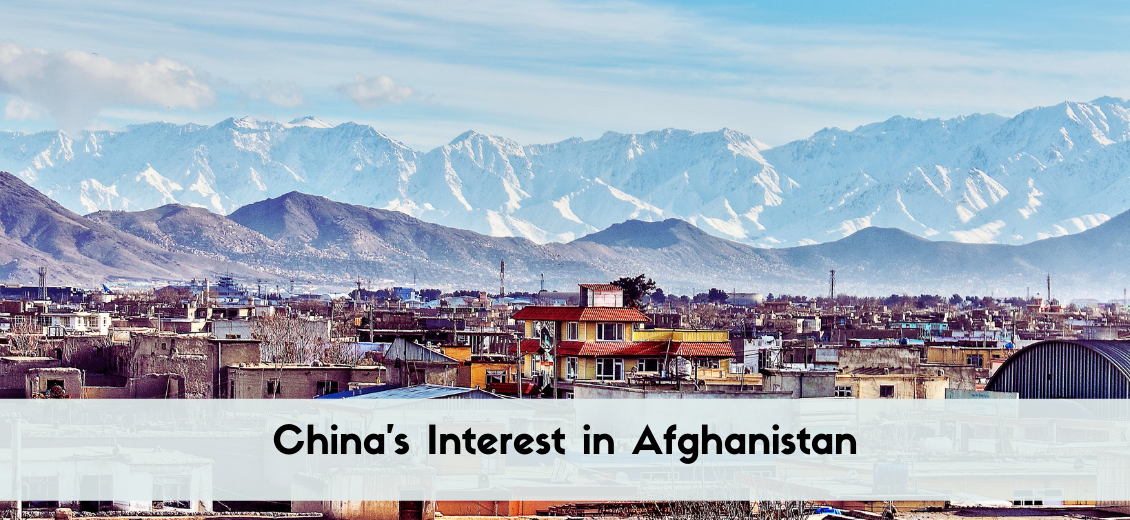China’s Interest in Afghanistan
Blogs Home
- 19 Nov 2021

The article here will discuss China’s interest in Afghanistan particularly after the Taliban’s takeover, provide a background to Afghanistan’s turbulent history particularly during the modern period, and will also touch upon the previous conflicts which prepared the ground leading to the present situation in the country. The article aims to provide an insight into the Afghan conflict, its impact on current world politics, and China’s interest in Afghanistan.
The history of Afghanistan is quite rich and extensive. The country has seen a lot of upheavals throughout its history that had far-reaching ramifications for the country as well as for the entire world, directly or indirectly.
Afghanistan has often been called albeit erroneously the “Graveyard of Empires” because of its history of being a place where some of the biggest powers and empires have witnessed some of their harshest defeats starting from the British Empire, to the Soviet Union, to the most recent, the United States of America.
Afghanistan has been the focal point of major geopolitical developments and changes taking place in the region. Historically, the country has been part of many empires and also finds a place for itself in the mythological lore of the Mahabharata. In the modern period, The Great Game of the 19th and early 20th century between Czarist Russia and the British Empire, marked the emergence of Afghanistan as an important territory and country on the world stage with regards to geopolitics. The period of The Great Game also covers the British Empire’s engagement in Afghanistan also known as the ‘Anglo-Afghan wars’.
The period following The Great Game and the Anglo-Afghan wars was marked by considerable stability and peace until the Soviet invasion of Afghanistan that began in December, 1979. The invasion by the Soviet Union was prompted by mass insurgencies and resistance that rose against the incumbent communist government, led at that time by the People’s Democratic Party of Afghanistan. The People’s Democratic Party of Afghanistan was the political entity out of which the People’s (Khalq) Party and the Banner (Parcham) Party had earlier emerged, and subsequently reunited in an uneasy coalition shortly before a coup. Led by left-wing military officers under the leadership of Nur Mohammad Taraki, both these parties shared the power between themselves after the overthrow of the previous government by the centrist President Mohammad Daud Khan. The resistance and the uprisings coupled with infighting within the ruling communist regime in Afghanistan finally prompted the Soviet Union to intervene militarily to restore normalcy and stability in Afghanistan.
The Soviet military invaded Afghanistan in 1979, starting one of the most violent and brutal resistance ever witnessed in the world, which also came to be known as the Afghan War. The resistance to the Soviet invasion and its subsequent prolonged occupation for nearly a decade was led by the Mujahideen. The Mujahideen followed an orthodox and traditional Islamic ideology. They were local fighters based in the rural as well as urban areas of the country. The Mujahideen were supported by America, Saudi Arabia, and Pakistan in their efforts to oust the Soviets from Afghanistan. They were largely fragmented into smaller independent units and lacked a centralised and coherent strategy. The Soviet debacle in Afghanistan, is often considered one of the major reasons for the breaking up and the subsequent fall of the Soviet Union later in 1991.
The Soviet withdrawal set in an era of instability and internal conflict with all the resistance groups fighting amongst themselves for control over the country. It was in this context that the Taliban was born under the leadership of Mohammad Omar which systematically managed to capture power and establish its rule over the country by 1996. The Taliban followed, and still follows, a very severe and orthodox interpretation of Islam. The Taliban also provided asylum and support to Al-Qaeda and its leader, Osama Bin Laden after his ouster from Sudan, due to his terror activities. With the support and help of Al-Qaeda, the Taliban captured almost the entire territory of Afghanistan barring a small part in the north which continued its resistance under the aegis of the Northern Alliance under the leadership of Ahmed Shah Massoud who was later assassinated.
On 11 September, 2001, Al-Qaeda carried out an aerial attack against the United States of America by hijacking and crashing commercial flights into the World Trade Centre, in New York, along with other important locations like the Pentagon. The attacks came to be known as the 9/11 attacks which left almost 3000 people dead. This attack prompted the US to demand from Afghanistan the extradition of Osama Bin Laden which was refused thus, resulting in the US-led invasion of Afghanistan and the start of the long and arduous Afghan conflict or the Afghanistan War. George W. Bush under whose presidency the 9/11 attacks took place declared the War on Terror also known as the Global War on Terrorism which began with the invasion of Afghanistan by the USA and Britain along with other allies. The entire course of the war witnessed the defeat of the Taliban, setting up of the Islamic Republic of Afghanistan under the leadership of Hamid Karzai, a prolonged Taliban insurgency, intensification of the conflict, change of leadership in the US, the killing of Osama Bin Laden, increase and then subsequent withdrawal of troop presence in Afghanistan, the controversial Afghanistan presidential elections, the official end of the Afghanistan War, beginning of the peace process, the Taliban onslaught culminating in the defeat of the Afghan forces, and finally the withdrawal of the last of the remaining combatants as well as the mass exodus of the general populace and other sections of the society from Afghanistan to other countries.
Now, coming to China and its interests in Afghanistan. The history of China and the process of its formation and evolution into a large, powerful, and influential communist state won’t be taken up for discussion in detail; rather its interest in Afghanistan will be taken up in the spheres of geopolitics, strategy, and economy.
China over the years, has established itself as a strong and influential nation across almost all spheres, be it economy, diplomacy, military, etc. The presence of strong and centralised administrative and political machinery, a big population, a stable and thriving economy, and an effective military are considered the reasons behind its successful positioning as an important and influential country globally.
China’s interests in Afghanistan can be broadly classified into the following two categories: Geopolitical and Economic. Both these aspects are interrelated to a large degree yet carry distinct individual significance as well.
Geopolitical
Nearly all countries give primacy to their security and strategic interests and the same is the case with China. China has been dealing with insurgency in its Xinjiang province, home to the Uyghur Muslims. China’s concern rather than interest in this aspect stems from the fact that the current situation in Afghanistan might prove beneficial to groups like the ETIM (East Turkestan Islamic Movement) which has a history of association with the Taliban and has presence in the Afghan territories. The takeover of the country by the Taliban will also prompt China to take into consideration aspects such as the spread of terrorism in the adjoining areas and more specifically in China itself. Though the Taliban has categorically stated that they will not allow their territories to be used for terror activities against other countries, the Taliban’s reliability in this regard remains to be seen. China has received a lot of criticism for its treatment of the Uyghur Muslim community in the Xinjiang province. China will also be wary of the risk to its investments in Afghanistan with the coming of the Taliban and would want an arrangement that assures their safeguarding and security. China will also be concerned about the spread of terrorism or a state of lawlessness in other parts of Central Asia with the takeover of Afghanistan by the Taliban as well because of its investment in the Belt and Road Initiative that passes through many areas of Central Asia.
China does not have any boots on the ground in Afghanistan nor it did in the past as well. China’s concern vis-a-vis the security and safety of its hinterland particularly in the Xinjiang province will rely on the level of cooperation and support it manages to get from the Taliban. Another important aspect that is worth mentioning is Pakistan, often called its “all-weather ally” by China. Pakistan will be playing a key role in this arrangement due to its association and support to the Taliban.
Another important component of China’s interest in Afghanistan is with regards to the perception of its growing influence and power in Asia. The withdrawal of America from Afghanistan due to its failure after years of engagement and conflict can and possibly will be used by China to advance a narrative of American decline and highlight it as a proof of American unreliability and incompetence. This perception of enhanced power due to the US withdrawal will embolden China to further such narratives about various other countries it has long-standing issues with, like India, Taiwan, etc.
Economic
With regards to China’s economic interests, the location of Afghanistan plays a key role since it lies at the crossroads of Central Asia and South Asia, and is a geographically strategic location that gives it a competitive advantage over others, in terms of being a regional hub for trade and transit. It has immense potential to link the markets of South Asia, Central Asia, West Asia and China, and can leverage its central position to drive development and economic growth back home.
China’s economic involvement in Afghanistan can be characterised as ‘lukewarm’, at best. China’s two largest investments in Afghanistan, the Mes Aynak copper mine project and the Amu Darya oil field project have not panned out as planned and promised by China. With the Taliban at the helm of affairs in Afghanistan, it will be interesting to see whether China commits to more such projects in the future.
China’s flagship Belt and Road Initiative and its extension via the CPEC (China-Pakistan Economic Corridor) into Afghanistan keeping in view its broader economic interests is something that the country will be watching more carefully but will also be wary of the security situation in Afghanistan brought about by the Taliban’s takeover of the country.
Finally, one of the major interests of China in Afghanistan will be the presence of the abundant and untapped natural resources present in Afghanistan, valued at approximately $1-3 trillion. Afghanistan is also said to have vast reserves of rare earth minerals such as cerium, with smaller amounts of more valuable lanthanum, praseodymium and neodymium, one of the world’s largest deposits of lithium (an essential but scarce component in rechargeable batteries and other technologies.) China will seek to utilise its expertise in mining these rare earth minerals to the fullest by exploiting these resources in Afghanistan to further strengthen its already hegemonic position in the field of rare earth minerals mining.
Conclusion
China has both geopolitical and economic interests in Afghanistan. Though China and Afghanistan did not have close ties previously, unforeseen changes and rapid developments have altered the geopolitical reality of the region and the world. A country like China will be weighing in and assessing its options and more importantly its interests in Afghanistan. China’s rather welcoming and supposedly positive attitude towards the Taliban is proof of the fact that China views this new paradigm, in an observant and a significant manner.

Arjit Sharma




